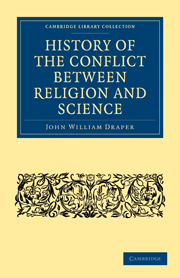Book contents
- Frontmatter
- Preface
- Contents
- CHAPTER I THE ORIGIN OF SCIENCE
- CHAPTER II THE ORIGIN OF CHRISTIANITY.—ITS TRANSFORMATION ON ATTAINING IMPERIAL POWER.—ITS RELATIONS TO SCIENCE
- CHAPTER III CONFLICT RESPECTING THE DOCTRINE OF THE UNITY OF GOD.—THE FIRST OR SOUTHERN REFORMATION
- CHAPTER IV THE RESTORATION OF SCIENCE IN THE SOUTH
- CHAPTER V CONFLICT RESPECTING THE NATURE OF THE SOUL.—DOCTRINE OF EMANATION AND ABSORPTION
- CHAPTER VI CONFLICT RESPECTING THE NATURE OF THE WORLD
- CHAPTER VII CONTROVERSY RESPECTING THE AGE OF THE EARTH
- CHAPTER VIII CONFLICT RESPECTING THE CRITERION OF TRUTH
- CHAPTER IX CONTROVERSY RESPECTING THE GOVERNMENT OF THE UNIVERSE
- CHAPTER X LATIN CHRISTIANITY IN RELATION TO MODERN CIVILIZATION
- CHAPTER XI SCIENCE IN RELATION TO MODERN CIVILIZATION
- CHAPTER XII THE IMPENDING CRISIS
- INDEX
CHAPTER I - THE ORIGIN OF SCIENCE
Published online by Cambridge University Press: 29 August 2010
- Frontmatter
- Preface
- Contents
- CHAPTER I THE ORIGIN OF SCIENCE
- CHAPTER II THE ORIGIN OF CHRISTIANITY.—ITS TRANSFORMATION ON ATTAINING IMPERIAL POWER.—ITS RELATIONS TO SCIENCE
- CHAPTER III CONFLICT RESPECTING THE DOCTRINE OF THE UNITY OF GOD.—THE FIRST OR SOUTHERN REFORMATION
- CHAPTER IV THE RESTORATION OF SCIENCE IN THE SOUTH
- CHAPTER V CONFLICT RESPECTING THE NATURE OF THE SOUL.—DOCTRINE OF EMANATION AND ABSORPTION
- CHAPTER VI CONFLICT RESPECTING THE NATURE OF THE WORLD
- CHAPTER VII CONTROVERSY RESPECTING THE AGE OF THE EARTH
- CHAPTER VIII CONFLICT RESPECTING THE CRITERION OF TRUTH
- CHAPTER IX CONTROVERSY RESPECTING THE GOVERNMENT OF THE UNIVERSE
- CHAPTER X LATIN CHRISTIANITY IN RELATION TO MODERN CIVILIZATION
- CHAPTER XI SCIENCE IN RELATION TO MODERN CIVILIZATION
- CHAPTER XII THE IMPENDING CRISIS
- INDEX
Summary
Religious condition of the Greeks in the fourth century before Christ.—Their invasion of the Persian Empire brings them in contact with new aspects of Nature, and familiarizes them with new religious systems.—The military, engineering, and scientific activity, stimulated by the Macedonian campaigns, leads to the establishment in Alexandria of an institute, the Museum, for the cultivation of knowledge by experiment, observation, and mathematical discussion.—It is the origin of Science.
No spectacle can be presented to the thoughtful mind more solemn, more mournful, than that of the dying of an ancient religion, which in its day has given consolation to many generations of men.
Four centuries before the birth of Christ, Greece was fast outgrowing her ancient faith. Her philosophers, in their studies of the world, had been profoundly impressed with the contrast between the majesty of the operations of Nature and the worthlessness of the divinities of Olympus. Her historians, considering the orderly course of political affairs, the manifest uniformity in the acts of men, and that there was no event occurring before their eyes for which they could not find an obvious cause in some preceding event, began to suspect that the miracles and celestial interventions, with which the old annals were filled, were only fictions. They demanded, when the age of the supernatural had ceased, why oracles had become mute, and why there were now no more prodigies in the world.
Traditions, descending from immemorial antiquity, and formerly accepted by pious men as unquestionable truths, had filled the islands of the Mediterranean and the conterminous countries with supernatural wonders—enchantresses, sorcerers, giants, ogres, harpies, gorgons, centaurs, cyclops.
Information
- Type
- Chapter
- Information
- History of the Conflict between Religion and Science , pp. 1 - 33Publisher: Cambridge University PressPrint publication year: 2009First published in: 1875
